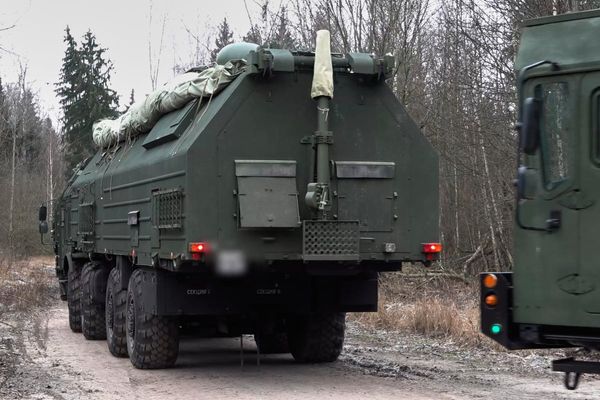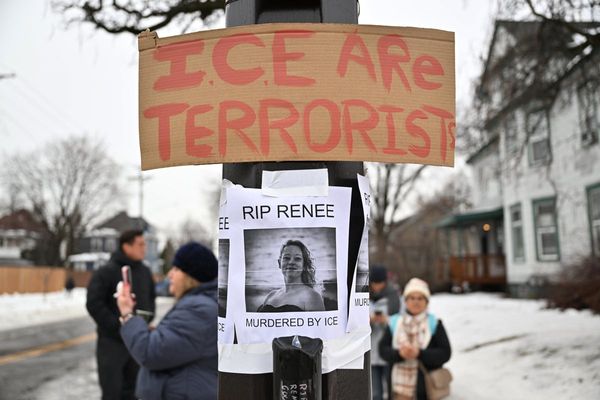
Wa Kong Lor, a Hmong refugee from the outskirts of Detroit, was deported to Laos last month with only a driver’s license and $65 in cash.
Lor had never set foot in Laos, where his parents fled after the end of the Vietnam war. Born in a Thai refugee camp, he’s considered stateless in the country, and unable to open a bank account to receive money from the US. For the past month, he’s been living off the $65, spending a couple of dollars a day on food, said his wife, Maiyia Xiong. He asked her not to tell his mother and four young children back in Michigan that he’s begun sleeping on the streets.
“I didn’t even get to say bye to my husband,” Xiong said. “I didn’t even get to hug him and say, ‘Whatever you’re going through, you’ll be okay, we’ll get through this together.’”
Desperate, Xiong created a GoFundMe to raise money for a plane ticket to Laos so she could find Lor, personally deliver him money and help him find housing. She said it seemed particularly cruel that, while she’s struggling to financially support her husband, a portion of her earnings as a non-profit teaching assistant is being funneled toward the government’s immigration agenda.
“They’re using my tax money to deport my husband,” she said. “Why are we paying for our families to be deported?”
Lor was among more than two dozen Hmong – an ethnic group with roots in south-east Asia – and Laotian immigrants deported to Laos on an 11 August flight, many of whom Immigration and Customs Enforcement (Ice) described as “heinous criminal illegal aliens”. Lor spent three years behind bars after being convicted of property, drug and weapons crimes when he was 21. The operation was the latest in a wave of deportation flights that have roiled south-east Asian enclaves in the midwest and across the country.
Since Donald Trump took office for a second time, forced removals of south-east Asians with criminal records have soared. In a single flight over Memorial Day weekend, Ice deported 93 Vietnamese and 65 Laotian nationals, according to Vo Danh, a collective of organizers advocating for the abolition of Ice. The Lao Embassy said that it has issued 145 people travel papers for deportation since January – a more than tenfold increase from previous years.
In the Twin Cities, home to the largest Hmong population outside of the US, immigrant advocates have been protesting and pushing hard for immigration reform, as more than 150 south-east Asians in Minnesota have been deported since May.
Kaohly Vang Her, a state representative, said she’s been discussing with Tim Walz, the governor, and Keith Ellison, the attorney general, about expediting the state pardon process, which can shield people from deportation by vacating their convictions.
The approach yielded some success in New York, as the governor Kathy Hochul pardoned a Lao refugee in early July to spare him from deportation, following a yearslong campaign from grassroots organizers.
Besides expediting the pardon process, Her said there are unfortunately few other levers that state legislators can pull. She’s instead focusing on informing her constituents about relevant immigration news, such as which Minnesota counties have agreements with Ice.
Many formerly incarcerated south-east Asians who are facing deportation, Her said, have long reformed and raised families. They work and pay taxes.
Ripping away breadwinners from families, Her said, creates “a ripple effect that will be really challenging to overcome”. Mothers and grandparents might have to apply for public assistance, she said, and a new generation of children could grow up with trauma.
South-east Asians are three to five times more likely to be deported than other immigrant groups due to a prior conviction, which can strip someone’s legal permanent resident status. The administration’s targeting of south-east Asians with old convictions, community advocates say, is creating yet another cycle of trauma and displacement for a group that’s suffered under generations of US foreign policy.
“We see these deportations as a betrayal of US duty to refugees,” said Quyen Dinh, executive director of the Southeast Asian Resource Center. “When you accept a refugee, you don’t accept them for just three to five years, you accept them for their entire lifetime.”
Since the fall of Saigon in 1975, more than 1.2 million refugees from Vietnam, Cambodia and Laos have settled in the US, forming the country’s largest refugee diaspora. Thousands of Hmong, fearing retaliation for their alliance with the US in the secret war, fled to refugee camps in Thailand before also making their way to America.
Many south-east Asians settled in low-income communities – including Long Beach and Stockton, California, and St Paul, Minnesota – with substandard housing and low-paying jobs, and few resources to treat lingering war trauma. Due to a lack of effective refugee resettlement programs in the 1980s and 1990s, Dihn said, many young people ended up joining gangs and committing crimes of poverty. Xiao said Lor was one example of this – that he had fallen in with a tough crowd after resettling in the US as a teenager who barely understood English.
More than 3 million people of south-east Asian descent reside in the US today, 17,000 of whom have removal orders largely tied to past convictions. More than 2,000 have been deported.
What helped paved the way for this, Dinh said, was the Illegal Immigration Reform and Immigrant Responsibility Act of 1996, which expanded the crimes that made immigrants eligible for deportation. It also made it harder for undocumented immigrants to gain legal status. Before the law was enacted, Dinh said, permanent residents and refugees who committed a crime would not be automatically deported, and would be given the right to plead their cases of transformation.
This year, deportations have accelerated as the Trump administration threatened sanctions to pressure Laos, which doesn’t have a formal repatriation agreement with the US, to take back deportees. Many immigration advocates are expecting the raids to ramp up after the supreme court lifted an order on 8 September that barred the administration from stopping people solely based on their race, language or job.
Tin Thanh Nguyen, a North Carolina-based immigration attorney, is representing two refugees from Vietnam and Laos who were flown in July to a maximum security prison in southern Africa. The men, aged 34 and 45, arrived in the US when they were children, Nguyen said. Both had served time for criminal offenses they committed as teenagers.
Nguyen said formerly incarcerated south-east Asians are easy targets for mass deportation because their information is already in the system as they attend annual Ice check-ins.
“They’re low-lying fruit,” Nguyen said. “They have final orders of removal and they’ve been checking in with Ice for years.”
In previous years, Nguyen said he was helping people fight those removal orders. The Trump administration is removing so many people so quickly that the strategy is no longer viable, he said. His focus now is helping detainees obtain travel documents so they can be sent to their homeland and not a third country.
Thao Ha, the executive director of the non-profit Collective Freedom, said new deportees to Laos need help securing safe housing, employment and citizenship. Loved ones in the US have turned to GoFundMe to raise money for food, clothing and basic necessities.
For those with final removal orders, Ha said, the cruelty of the process itself is often more frightening than the prospect of restarting their lives in another country.
“They’ve accepted that deportation is their fate,” she said. “But why does it have to be this way, the sudden detention, sudden snatching away without warning?”
Kua Yang had been a free man for only a year and a half when he was deported to Laos, a country he had never been to.
Yang, 47, was born in a refugee camp in Thailand and resettled with his family in Stockton, California. At 16, he received a life sentence for gang-related armed robbery. In 2023, after serving 28 years in prison, he was released on parole and reconnected with his mother and two sisters, who he hadn’t seen since they were infants. He taught their daughters how to read and write.
Then, in March, the crime for which Yang spent half a lifetime repenting sent him to a foreign homeland. In Vientiane, the sweltering Laotian capital, he saw widespread despair.
“Some people miss their kids so much,” he said. “They just stay in their rooms and drink.”
So Yang and two other deportees partnered with Collective Freedom to help new deportees readjust and find housing. They deliver care packages, hygiene items, food and cash to anyone who needs it. He’s working on establishing a transitional home with job training workshops. During the week, he teaches English to Lao citizens.
“Helping others gave me a purpose,” he said. “When I first came here I thought, ‘What am I going to do in this land?’ Now, I’d say I believe in a life here.”







